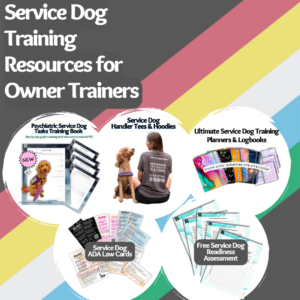Service dogs are invaluable companions for individuals with disabilities, providing essential assistance and enhancing their quality of life. However, service dog handlers often encounter a myriad of challenges in their daily lives. In this blog post, we'll shed light on some of these challenges and provide suggestions on how to navigate them with grace and resilience.
Lack of Awareness and Legal Misunderstandings:
- Challenge: Many people, including business owners and the general public, remain unaware of the laws surrounding service dogs. This lack of awareness can lead to misunderstandings and discrimination against handlers.
- Suggestion: As a handler, carry copies of relevant laws and educate people politely about your rights and your service dog's role. Encourage respectful discussions to raise awareness.
Public Misconceptions:
- Challenge: Widespread misconceptions about service dogs persist, with some confusing them with emotional support animals or assuming they are there solely for entertainment, like therapy dogs.
- Suggestion: Share your knowledge about service dogs on social media, host informational sessions, or collaborate with local disability advocacy groups to dispel myths and educate the public.
Distractions and Endangerment:
- Challenge: Service dogs can be put at risk when people attempt to interact with or distract them in public. These actions not only disrupt the dog's work but also endanger the handler's safety.
- Suggestion: Utilize "Do Not Pet" patches and polite signage on your service dog's gear. Be assertive but courteous when requesting others to refrain from interacting with your dog.
Invasive Questions and Privacy Intrusions:
- Challenge: Strangers frequently ask invasive and inappropriate questions about the handler's disability, their service dog, or even their medical history, violating their privacy.
- Suggestion: Practice assertive yet respectful responses. Offer to educate in a non-confrontational manner, but remember that you're not obligated to disclose personal information.
Public Stares and Unwanted Comments:
- Challenge: Handlers often endure open stares and unsolicited comments about their service dogs, creating discomfort and self-consciousness.
- Suggestion: Develop a support network of friends and fellow handlers who can empathize with your experiences. Share strategies for coping with unwelcome attention.
Emotional Toll and Mental Drain:
- Challenge: Dealing with the emotional toll stemming from discrimination, access issues, public misconceptions, and intrusive interactions can be mentally draining for service dog handlers.
- Suggestion: Consider seeking support from mental health professionals who specialize in disability-related stress. Engage in self-care practices, such as mindfulness and relaxation techniques.
Social Isolation and Loneliness:
- Challenge: The demands of having a service dog and discomfort in social situations can lead to feelings of social isolation among handlers, impacting their overall well-being.
- Suggestion: Seek out local and online communities of service dog handlers for support, advice, and companionship. Attend social events that are accommodating to service dogs.
Maintaining Independence:
- Challenge: Balancing the need for assistance from a service dog with maintaining a sense of independence and self-sufficiency can be a delicate challenge for handlers.
- Suggestion: Collaborate with a professional dog trainer to ensure your service dog's training aligns with your specific needs and lifestyle, promoting independence.
Access Refusals:
- Challenge: Some businesses or public establishments may deny entry or service to individuals with service dogs, despite legal protections.
- Suggestion: Familiarize yourself with the laws in your area and assert your rights calmly but firmly. Report access refusals to relevant authorities when necessary.
Conclusion: Service dog handlers face a multitude of challenges daily, from lack of awareness to emotional tolls and access refusals. By advocating for themselves, raising awareness, and seeking support, handlers can navigate these challenges with resilience, ensuring their service dogs can provide the assistance they were trained for while promoting understanding and inclusion in their communities.

